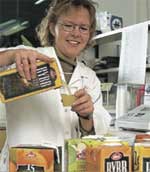WideStream makes the juice flow
Alfa Laval has designed a special plate - WideStream - for pasteurizing fruit juices that have a high fiber content. Marli, in Finland, uses WideStream for a wide range of juices and other beverages.
DATE 2023-11-28These increasingly popular fruit juices that contain pulp and fiber pose a major problem for the traditional plate heat exchangers (PHEs). Quite simply, the fibers clog the PHE’s channels, resulting in short operating times and uneven pasteurization.
To eliminate this problem, Alfa Laval has constructed a special plate - WideStream - with far fewer contact points (ca. 1/10) as compared with an ordinary plate. The WideStream plate requires no extraordinary measures: it is introduced into an ordinary FrontLine frame.
Marli, located in Turku on the Baltic coastline of Finland, is the country’s leading producer of fruit juices. The company was launched in the 1860s with a small-scale production of fruit wines, but today 90% of its production consists of juices, fruit syrups and nectars. After having tested different methods of pasteurizing fiber-rich juices, Marli selected WideStream.
Meeting exacting demands
“We pasteurize many different kinds of fruit juices, all with their own individual eccentricities,” says Jarmo Gröndahl, Marli’s product manager. “So what we wanted was to have the heat exchanger be so flexible that it could deal with all of our products. And today we even process tomato juice, which requires a pasteurization temperature of over 125°C, in the WideStream apparatus. No problem!”
WideStream is designed to meet exacting demands. The gaskets and the plates are manufactured with great precision, and maintain very high quality. And on top of all that, the heat exchanger operates with a minimal temperature difference between the medium and the product, just around 2°C. This provides superior process control and eliminates the risk of burn on.
“The low temperature difference means that we avoid overpasteurization. The final product gets a better taste even as the strain on the plates and gaskets is minimized,” says Jarmo Gröndahl. “Another advantage of WideStream is the long operating times. We run certain products all the way up to 60 hours before cleaning in place, and the plate heat exchanger is very easy to clean. That means low maintenance costs.”
Jarmo Gröndahl is also very pleased with the PHE’s lean design, both inside and outside. “It makes it easy to put it where we want it, and we loose a minimum of juice when it’s time to clean the plates.”
At present Marli has three WideStream units with capacities of 6,600, 2,600 and 900 liters per hour.

